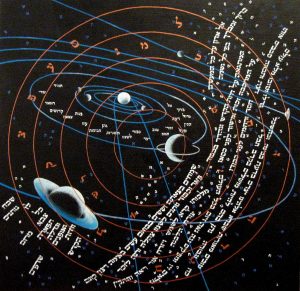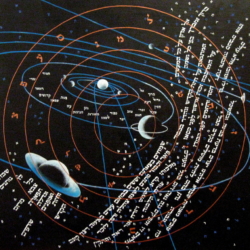| Source (Hebrew) | Translation (English) |
|---|---|
אֵל אָדוֹן עַל כָּל־הַמַּעֲשִׂים בָּרוּךְ וּמְבֹרָךְ בְּפִי כָל הַנְּשָׁמָה גָּדְלוֹ וְטוּבוֹ מָלֵא עוֹלָם דַּעַת וּתְבוּנָה סוֹבְבִים הוֹדוֹ |
God master of all creations blessed and praised by every soul His greatness and goodness fill the universe knowledge and wisdom surround Him |
הַמִּתְגָּאֶה עַל חַיּוֹת הַקֹּדֶשׁ וְנֶהְדָּר בְּכָבוֹד עַל הַמֶּרְכָּבָה זְכוּת וּמִישׁוֹר לִפְנֵי כִסְאוֹ חֶסֶד וְרַחֲמִים מָלֵא כְבוֹדוֹ |
He is exalted above the celestial beings and adorned in honor above the chariot Virtue and honesty stand before His throne grace and mercy are abundant in Him the worlds reflect. |
טוֹבִים מְאוֹרוֹת שֶׁבָּרָא אֱלֹהֵינוּ יְצָרָם בְּדַעַת בְּבִינָה וּבְהַשְׂכֵּל כֹּחַ וּגְבוּרָה נָתַן בָּהֶם לִהְיוֹת מוֹשְׁלִים בְּקֶרֶב תֵּבֵל |
Good are the luminaries created by our God crafted with knowledge, wisdom and insight Strength and might He placed in them to reign over the universe |
מְלֵאִים זִיו וּמְפִיקִים נוֹגַהּ נָאֶה זִיוָם בְּכָל־הָעוֹלָם שְׂמֵחִים בְּצֵאתָם שָׂשִׂים בְּבוֹאָם עוֹשִׂים בְּאֵימָה רְצוֹן קוֹנָם |
Full of brilliance they radiate brightness beautiful is their brilliance throughout the world They rejoice in their rising and delight in their setting performing with reverence the will of their Creator |
פְּאֵר וְכָבוֹד נוֹתְנִים לִשְׁמוֹ צָהֳלָה וְרִנָּה לְזֵכֶר מַלְכוּתוֹ קָרָא לַשֶּׁמֶשׁ וַיִּזְרַח אוֹר רָאָה וְהִתְקִין צוּרַת הַלְּבָנָה |
Glory and honor do they give to His name revelry and song for His Majesty He called forth the sun and it shone light He saw fit to regulate the form of the moon |
שֶׁבַח נוֹתְנִים לוֹ כָּל־צְבָא מָרוֹם תִּפְאֶרֶת וּגְדֻלָּה שְׂרָפִים וְחַיּוֹת וְאוֹפַנֵּי הַקֹּדֶשׁ |
All the hosts of heaven give Him praise Serafim, Ophanim and Celestial Beings attribute magnificence and greatness |
The piyyut “El Adon” by an unknown author is one of the oldest piyyutim known, from late Antiquity. Note that in El Adon, the acrostic line for the letter samekh uses the sin in its place, the two being phonetically equivalent. There are some minor variations between the text as provided in the Sefaradi and Ashkenazi liturgical customs. Macy Nulman writes in his entry on “Ayl Adon” in Encyclopedia of Jewish Prayer (1993, pp. 61-62):
A Piyyut arranged in alphabetical acrostic form recited in the Yotzayr benediction on Shabbat and, according to the Ashkenazic rite, on a festival day when it coincides with Shabbat. If the festival day is a weekday, it is omitted. Sephardim recite Ayl Adon (“God, the Master of all works”) on Shabbat and even on festivals that occur on weekdays. The poem is alluded to in the Talmud[1] Hagigah 3b. and appears in the Zohar,[2] Terumah 132a, Vayakhayl 205b. and it is generally attributed to the Yorday Merkavah (Descenders/Riders of the Chariot), mystics of the mid-first millennium. The chariot referred to in the Piyyut (“and is splendrous in glory above the chariot”) is derived from the vision of Ezekiel in his Ma’asayh Merkavah prophesy (Ezekiel chaps. 1 and 10).
The poem, introduced into the Sabbath liturgy by the Ge’onim, has no uniformity in meter. Its alphabetical arrangement is to illustrate that God created the world for the sake of the Torah, which is written in twenty-two letters of the Hebrew alphabet.[3] Abudraham. ) The first verses (Ayl and Barukh) each contain five words, adding up to ten and alluding to the “ten words” by which God created the world.[4] Avot 5.1. The two final verses (Shevah and Tiferet) have six words each, a total of twelve, to correspond to the twelve zodiacal signs.[5] Berakhot 32b. The intermediate eighteen verses (from Godlo to Ra’ah) contain four words, the total adding up to seventy-two, which corresponds to the Divine Name of seventy-two letters.[6] Cf. Kol Bo; see also Zohar, Parshat Terumah.
The poem is an homage to God for the creation of the heavenly hosts–the sun, the moon, and stars. After having mentioned the sun and moon, whose functions are well known, the author also alludes to the five planets, Shabtai (Saturn), Nogah (Venus), Kokhav (Mercury), Tsedek (Jupiter), and Ma’adim (Mars) by means of the initial words of the next to the final verse, Shevah Notnim Kol Tseva Marom.[7] Iy Tef, vol. 1, p.682; cf. also Shabbat 156a. Although there are several textual variations between Ashkenazim and Sephardim , both have the same number of words in the poem, based on the dictum that one not alter the number of words in Ayl Adon.[8] Magen Avraham to OH, chapter 281.
The English translation was made by Sara-Kinneret Lapidot as published in Invitation to Piyut North America: 18 Piyutim & Mizmorim (2010), p.29. –Aharon Varady
Source(s)

Notes

“אֵל אָדוֹן (מנהג הספרדים) | El Adōn, a piyyut attributed to the Yordei Merkavah (translation by Sara-Kinneret Lapidot)” is shared through the Open Siddur Project with a Creative Commons Attribution-ShareAlike 4.0 International copyleft license.








Leave a Reply